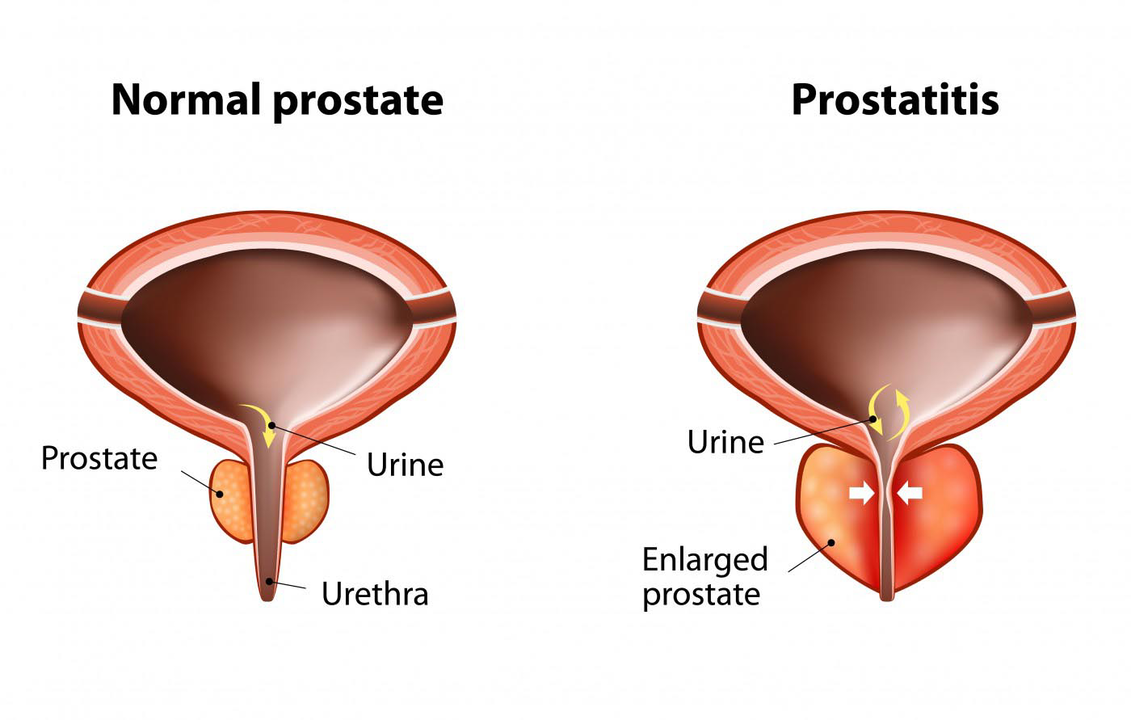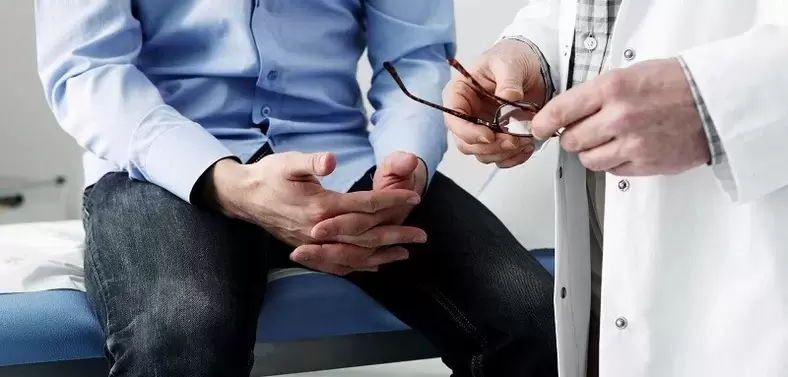Prostatitis is an inflammation of the prostate. It is one of the most common diseases among men. It is mainly men over 30 who are affected. If left untreated, the disease progresses rapidly and causes serious complications: infertility, impotence and cancer.
Most often, prostatitis is manifested by painful urination, purulent and bloody discharge in urine and sexual dysfunction.

The prostate is the organ that produces sperm and regulates urination. It is located under the bladder. Consists of three departments. During ejaculation, the prostate begins to contract, pushing seminal fluid into the urinary canal. The gland helps limit urinary incontinence, the formation of an erection and the production of sperm.
Prostate juice contains a large amount of proteins, fats, enzymes and even some vitamins. The juice dilutes the seminal fluid, thus promoting sperm viability. The prostate is an active organ. It depends on hormonal levels and itself participates in the formation of sex hormones.
Causes
It is difficult to identify the exact cause that triggered the development of prostatitis in a particular person. Most likely, it will be a set of factors that, to one degree or another, led to the problem.
Let's consider the causes and factors that can contribute to the development of prostatitis:
- Hypothermia and stress. The body's defenses are reduced, which contributes to the occurrence of inflammatory processes.
- Hormonal imbalances. The level of sex hormones affects the activity of the prostate.
- Sexually transmitted infections and urinary tract infections.
- Various disorders of the body's mechanisms: urination disorders, pelvic congestion. A hypodynamic lifestyle and tight underwear interfere with blood circulation in the pelvis. And problems with urination contribute to irritation of the glandular tissue and cause prostatitis. Constipation can also be considered a predisposing factor.
- Prolonged abstinence from sexual intercourse, interrupted sexual intercourse or artificial prolongation of sexual intercourse. This leads to enlargement of the gland and its inflammation.
- Poor diet and alcohol abuse.
Prostate infection can occur in 4 ways:
- Descending - enters with the flow of urine.
- Ascending – rises along the urethra.
- Lymphogenic - with lymphatic flow.
- Hematogenous - with blood flow.
Symptoms and signs of prostatitis
Symptoms of prostatitis can vary. Depending on the nature of the course, there are acute and chronic prostatitis.
Common signs of prostatitis include:
- urination problems – they are frequent, intermittent and difficult;
- deterioration of erection;
- burning sensation in the groin;
- urine is cloudy and contains fibers;
- the orgasm is not brilliant;
- increased fatigue;
- decrease in power;
- depression, anxiety.
Acute prostatitis most often begins with an increase in body temperature up to 39-40 degrees. The prostate swells, causing problems urinating. It is difficult and accompanied by pain.
During an exacerbation of prostatitis, the patient feels pain in the perineum, as well as in the rectum, groin and sacrum.
Acute prostatitis can be catarrhal, follicular and parenchymal. Characteristics of acute prostatitis:
- Acute follicular prostatitis is characterized by low jet pressure during urination. It is accompanied by intense pain, which can radiate towards the anal region, intensifying particularly during defecation. A slight increase in temperature is possible.
- Acute parenchymal prostatitis is characterized by unexpected pain with throbbing in the perineal region. Intoxication of the body is observed, the temperature can reach 40 degrees. Often accompanied by urinary retention.
- Acute catarrhal prostatitis causes pain in the perineum, frequent urination and pain when urinating.
Chronic prostatitis can progress from an acute form, but most often it immediately progresses to a chronic form. The symptoms are erased, without clear signs and manifestations.
Symptoms and signs caused by chronic prostatitis:
- decreased erection and libido;
- decreased flow pressure during urination;
- cramps and pain when urinating;
- aching pain in the perineum, anus, sacrum.
Since the signs of chronic prostatitis are not clearly expressed, the patient often does not pay attention to the symptoms for a long time, which worsens its development and can lead to complications.
Diagnosis of prostatitis
Medicine does not stand still and the diagnosis of prostatitis is not difficult. After collecting the history, the doctor may prescribe various diagnostic methods to confirm the diagnosis of prostatitis.
- Palpation of the prostate through the rectum to diagnose prostatitis. It will reveal pain and an increase in size, and these are characteristic signs of the inflammatory process, and during palpation, prostate secretion is released, which is sent for analysis.
- Ultrasound examination.
- Microscopic examination of prostate secretion.
- Bacteriological examination of urine.
- A smear of mucous membranes and glandular secretions to detect infection.
- Analysis of a smear from the urethra to determine sexually transmitted infections that can cause prostatitis.
- Blood test to determine sex hormones.

These diagnostic measures allow not only to confirm the diagnosis, since usually the symptoms are quite pronounced, but also to identify the cause of the disease.
Treatment of prostatitis
There are currently many treatment options for prostatitis. These include traditional methods and traditional medicine methods. Traditional medicine can serve as a complement to basic therapy. It is dangerous to treat prostatitis yourself, as it can lead to complications.
Doctors still resort to the traditional medicinal method to treat prostatitis. This helps relieve swelling, severe inflammation and normalize the functioning of the prostate.
Usually a complex of various methods is prescribed:
- rectal suppositories. Reduce pain and relieve inflammation;
- injections;
- non-steroidal anti-inflammatory drugs;
- instillation - the drug is injected directly into the prostate;
- microenemas;
- medicines in tablets. Most often, antibacterial drugs;
- alpha-blockers.
The set of therapeutic measures is selected individually, depending on the degree of the disease, the manifestation of symptoms and the expected therapeutic effect for the patient.
If a bacterial cause of prostatitis is identified, then broad-spectrum antibiotics are prescribed, capable of destroying several strains of bacteria. They can come in the form of suppositories, in the form of tablets and in the form of injections.
Painkillers are used to relieve pain.
Alpha blockers - help relax the muscles of the urethra, a consequence of prostatitis. To relieve tension in the perineal region, various muscle relaxants are used.
A necessary step would be to improve blood circulation to relieve congestion and take vitamins.
Various physiotherapeutic procedures and prostate massages are mandatory for the treatment of prostatitis. Prostate massage is used for all forms and stages of development of the disease, it improves blood circulation and squeezes secretions with a pathogenic environment into the urethra.
Some scientists have become skeptical of this method of treating prostatitis, arguing that the pathogenic environment penetrates further into the genitourinary system and contributes to inflammation of other organs. Experiments are currently underway, this point of view has not been refuted or clinically proven, therefore massage is an integral part of the treatment of prostatitis.
Traditional home treatment
Traditional medicine is often used in the treatment of prostatitis at home. If chronic prostatitis is diagnosed, additional treatment with folk remedies will be very useful. It will not be superfluous in case of acute manifestation of prostatitis, however, treatment only at home is unacceptable.
Among the popular methods, the following can be called very effective:
- Treatment of prostatitis with pumpkin seeds. Pumpkin seeds contain a large amount of zinc, which is necessary for men whether they suffer from prostatitis or not.
- Treatment of prostatitis with parsley - helps relieve inflammation and normalize sexual function. Contains a large amount of vitamins.
- Treatment of prostatitis with infusions of hemlock and celandine. This method should be used with caution, as these herbs are toxic and strict adherence to the dosage and dosing regimen is necessary.
- Treatment of prostatitis with wormwood. Used to relieve inflammation and eliminate purulent infections.
- Treatment of prostatitis with garlic, dill, hazelnuts, chestnuts, propolis, herbs, etc.
Most of these methods are aimed at relieving inflammatory processes and normalizing sexual function. A large number of different vitamins saturate the body, which plays a role in preventing exacerbations of prostatitis.
Consequences of prostatitis
If you refuse and treatment for prostatitis is not started on time, there is a high probability of developing serious complications. Among the complications:
- infertility;
- incapacity;
- HBP;
- prostate cancer and others.
If treatment is refused, the infection will further penetrate into nearby tissues. Other prostate diseases can also develop, including stones and cysts.
With prostatitis, the level of sex hormones decreases, which leads to a decrease in sexual desire (libido). Erectile dysfunction begins and premature ejaculation may occur. Impotence is possible.
Prostatitis also leads to infertility. This problem is particularly common in patients who have developed chronic prostatitis. This complication is observed in half of these patients.
Prostate sclerosis may develop. In this case, the gland partially or completely stops functioning. This problem is accompanied by severe pain, sexual dysfunction and urination problems.
Prostate adenoma and prostate cancer are the most dangerous complications of prostatitis.
The problems and complications caused by prostatitis affect a man's sex life in one way or another. This leads to psychological problems, stress and depression.
It is important to carefully monitor the signs in order to recognize chronic prostatitis in time.
Prostatitis prevention
Prevention of exacerbations is aimed at monitoring health status and timely identification of problems. Since in most cases prostatitis is a consequence of untreated diseases of the genitourinary system, special attention should be paid to the treatment of these diseases.
Prostatitis is considered a disease that is easier to prevent than to cure.
Among the preventive methods, the most important are:
- Sporting activities. They serve to improve blood circulation in the pelvis, prevent the appearance of congestion and strengthen the pelvic muscles.
- Regular sex life. Medicines intended to artificially prolong sexual intercourse, interrupt sexual intercourse and suppress ejaculation are undesirable.
- Refusal of promiscuity. A violent sex life leads to sexually transmitted infections.
- Adequate and healthy diet.
- Stop drinking alcohol.
- Strengthen the body's defenses, avoiding hypothermia.
- Minimize stress.
Prostatitis has a low rate of self-healing or home treatment. Therefore, at the first signs, you should immediately contact a urologist to prescribe adequate treatment. You should also carefully monitor the signs indicating chronic prostatitis and consult a doctor in time.































